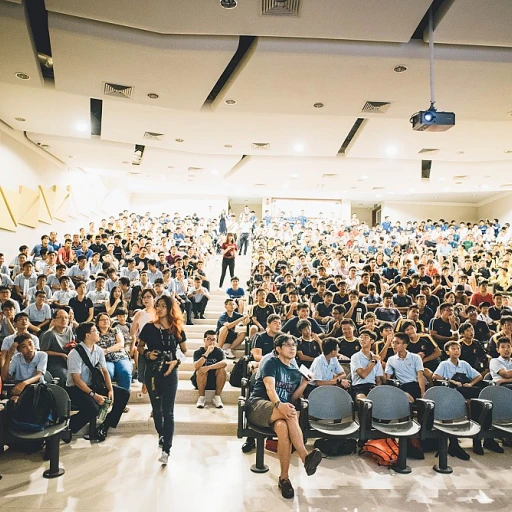Understanding Talent Management
Embracing Effective Talent Strategies
The realm of talent management plays a crucial role in leveraging a company's most valuable asset: its human resources. It involves a strategic approach to attract, develop, and retain employees, ensuring that organizations have the right skills available to achieve their business objectives. At its core, talent management is about aligning the goals and resources of an organization with the aspirations and capabilities of its workforce.
Incorporating elements such as learning and development, performance management, and employee relations, effective talent management helps create a cohesive system that enhances organizational effectiveness. The focus isn't just on filling job positions but on nurturing employees' skills and aligning them with long-term business strategies, thus fostering a culture of continuous growth and development.
With the integration of HR information systems and advanced technologies, talent management has transformed into a more data-driven process. These tools offer insights into personnel dynamics, aiding recruitment coordinators and management coordinators in making evidence-based decisions that bolster both individual and collective performance.
Employing robust systems to handle tasks such as job postings, employee administration, and talent acquisition can greatly streamline operations. Moreover, it can enhance security measures and contribute to achieving strategic business goals. As companies strive to compete in a rapidly evolving marketplace, efficient management of human resources becomes increasingly integral to success.
Who is a Talent Coordinator?
The Role and Responsibilities of Talent Coordinators
In the world of talent management, a Talent Coordinator plays a pivotal role in ensuring that the right skills meet the right jobs within an organization. This role serves as a vital link between candidates and opportunities, and as such, involves a mix of strategic planning and hands-on management. A Talent Coordinator is fundamentally responsible for supporting the recruitment and management of employees, which includes tasks such as job postings, screening resumes, scheduling interviews, and coordinating onboarding processes. Additionally, they are actively involved in employee relations, ensuring a seamless integration for new employees into the company culture. Here are some key responsibilities that define the role of a Talent Coordinator:- Collaborate with different departments to understand and plan for their talent needs and help align these with business goals and objectives.
- Assist in the talent acquisition process by implementing inclusive recruitment strategies to attract a diverse pool of qualified candidates.
- Monitor and manage resources to ensure effective recruitment procedures and the timely filling of jobs.
- Utilize human resources information systems to manage and evaluate data related to candidate and employee performance.
- Support the development and implementation of skills and learning development programs that enhance employee performance and career growth.
Key Challenges for Talent Coordinators
Challenges in Navigating Talent Management
Talent coordinators, pivotal in the talent management landscape, encounter a myriad of challenges in their roles. The ever-evolving demands of business environments require coordinators to deftly manage human resources while adapting to technological advancements and maintaining employee satisfaction. One significant hurdle is integrating a strategic approach with daily operational tasks. Coordinators must balance aligning talent management strategies with organizational goals and objectives, ensuring that the skills and capabilities of employees are effectively leveraged. This often requires liaising with other departments, such as public relations and social services, to coordinate efforts in learning development and talent acquisition. Additionally, data management poses its own set of challenges. With a wealth of employee performance and development information at their disposal, talent coordinators need to handle this data efficiently and securely, all while adhering to industry regulations and privacy standards. This requires familiarity with sophisticated HR Information Systems, which assist in streamlining employee records and can substantially enhance the efficiency and accuracy of management processes. More insights on this can be found in streamlining employee records. Furthermore, the role involves navigating the complexities of recruitment and retention, ensuring that job postings attract the right candidates, and that the employee experience fosters growth and commitment. As talent coordinators work to meet the expectations of both management and employees, they must also manage the ever-present risk of employee turnover, which can disrupt the continuity of skills and performance within the organization. In summary, the terrain of talent management presents coordinators with numerous challenges, demanding a blend of strategic insight, administrative prowess, and technological acumen. The constantly shifting landscape necessitates a proactive approach, embracing change and innovation to drive success across all levels of jobs and human resources management.Leveraging HR Information Systems
Harnessing HR Technology for Talent Coordinators
Talent coordinators play a pivotal role in managing various aspects of talent management, and leveraging Human Resources Information Systems (HRIS) becomes essential to their effectiveness. These systems serve as invaluable tools that facilitate coordination and streamline processes in talent acquisition, development, and retention. Modern HRIS solutions enable talent coordinators to handle data more efficiently, allowing them to focus on strategic initiatives rather than administrative tasks. They provide comprehensive insights into employee performance, job requirements, and skills development, which aid in aligning the workforce with the organization's goals and objectives. Through data-driven decision-making, these systems enhance the ability of talent coordinators to address the dynamic human resource needs of a business. Moreover, HRIS offer robust security controls, ensuring that sensitive employee data is protected. This is crucial as coordinators manage intricate data sets related to employees' job titles, recruitment status, and performance metrics. Additionally, HR technology supports seamless integration with other business administration tools, promoting smoother workflows and communication across teams. Learning and development are vital components of talent management. HRIS platforms often include modules designed to track and support employee growth. Whether coordinating training sessions or managing job postings for new roles, these systems enable talent coordinators to facilitate continuous learning opportunities, fostering skills development and enhancing overall job satisfaction among employees. By effectively utilizing HR technology, talent coordinators can transform talent management processes, improving alignment with business objectives and contributing significantly to organizational success. Such advancements not only streamline their work but also empower them to focus on strategic endeavors that propel the organization forward.Impact on Organizational Success
Driving Organizational Success through Effective Talent Coordination
The role of a talent coordinator is pivotal in ensuring that an organization not only attracts but also retains the best talent. This position is at the heart of talent management, aligning closely with business objectives and strategic goals. By effectively managing human resources, talent coordinators play a crucial role in enhancing the overall performance of employees, which directly impacts the success of the organization.
In today’s competitive business environment, organizations are increasingly relying on the expertise of talent coordinators to manage their workforce efficiently. This involves a strategic approach to recruitment, skills development, and employee relations. A well-coordinated talent management strategy ensures that employees are engaged, motivated, and aligned with the company's goals, leading to improved job performance and business outcomes.
Moreover, talent coordinators are tasked with the responsibility of utilizing data-driven insights to inform decision-making processes. By leveraging HR information systems, they can access valuable data that helps in identifying skills gaps, forecasting future talent needs, and developing targeted learning and development programs. This not only enhances employee performance but also ensures that the organization is well-prepared to meet future challenges.
In essence, the impact of a talent coordinator extends beyond mere administration. They are instrumental in fostering a culture of continuous improvement and innovation, which is essential for achieving long-term success. By aligning talent management strategies with business goals, they contribute significantly to the overall growth and competitiveness of the organization.











